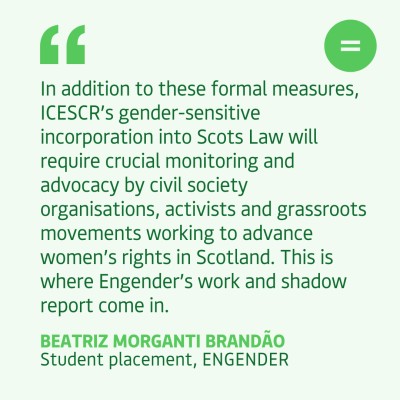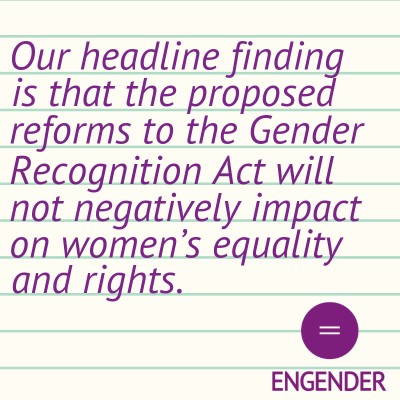Engender blog
Engender’s shadow report to CESCR: a key tool for promoting a gender-sensitive incorporation of ICESCR and improving women’s lives in Scotland
For many years women's equality advocates have been campaigning for the incorporation of CEDAW into Scots Law, but that isn't the only UN Convention which is key for the protection of women's equality and rights. This final blog from student Beatriz Morganti Brandão sums up her work to explore how the International Covenant on Economic, Social and Cultural Rights can be used to protect women in Scotland.

For my final post, I want to share the main findings from the research report I prepared as part of my placement with Engender. Broadly speaking, the report aims to support Engender’s mission of enabling women’s rights in Scotland. Specifically, given the Scottish Government’s recent commitment to incorporate the International Covenant on Economic, Social and Cultural Rights (ICESCR or the Covenant) into Scots Law, the report focused on preparing a draft of Engender’s shadow report for the upcoming review by the UN Committee on Economic, Social and Cultural Rights (CESCR) of the UK Government’s seventh periodic report on measures taken to implement ICESCR, which includes Scotland-specific information. The idea is that, through this shadow report, Engender attracts international scrutiny over the economic, social and cultural rights-situation for women in Scotland, and influences a gender-sensitive incorporation of ICESCR that actually improves women’s lives in the country.
ICESCR’s incorporation into Scots Law: challenges and opportunities from a women’s rights perspective
-400.png)
For many years women's equality advocates have been campaigning for the incorporation of CEDAW into Scots Law, but that isn't the only UN Convention which is key for the protection of women's equality and rights. Engender is excited to be working with student Beatriz Morganti Brandão to explore how the International Covenant on Economic, Social and Cultural Rights can be used to protect women in Scotland. Here she explains more about what she'll be working on.
In March 2021, the Scottish Government announced its plans to adopt, by 2025, a landmark human rights bill that will incorporate four United Nations human rights treaties into Scots Law. Among these treaties is the International Covenant on Economic, Social and Cultural Rights (ICESCR), which establishes the rights to work, housing, health, education, social security, and many others covering basic needs.
CEDAW: how are the UK and Scottish Governments responding to the recommendations?
-400.png)
During the 8th periodic review of the UK from the Committee of the Convention on the Elimination of All Forms of Discrimination Against Women, the UN Bill of Rights for women, several recommendations were made to the UK Government to improve women's equality and rights (find out more about the CEDAW process here).
These recommendations included three specific areas that the UK is meant to feedback their progress on – incorporation of CEDAW, the impacts of Brexit, and an oversight mechanism for women’s participation in CEDAW at UK level. The UK Government has submitted its progress report on these areas, but it didn’t consult with any of the organisations who have been involved with the CEDAW process at UK level (Engender, the Women's Resource Centre, the Northern Ireland Women’s European Platform, and Women’s Equality Network Wales), and it’s fair to say they were wearing their rose-tinted glasses while writing their report.
Incorporating CEDAW - what a new human rights bill could do for women in Scotland
Last week marked the start of Incorporation Fortnight – a two week campaign led by the Human Rights Consortium Scotland focused on human rights incorporation and a new human rights law for Scotland. In this blog, our Policy and Parliamentary Manager Eilidh Dickson explores incorporation of CEDAW and what it could mean for women in Scotland.
-400.png)
Just before the May 2021 election, the then Scottish Government announced its intention to bring in a new human rights bill in the next parliament that would serve as a new human rights framework for Scotland.
Following years of work by the Taskforce on Human Rights and the Advisory Group on Human Rights, the Scottish Government accepted the recommendation that such a Bill should incorporate a range of international human rights treaties, including the United Nations Convention on the Elimination of All Forms of Discrimination Against Women (CEDAW). Most parties shared this commitment at the election and work on the bill is imminent.
Engender has long called for incorporation of CEDAW into Scots Law (read our report here) and we're excited to get to work on the bill process because of the opportunities we see for progressing substantive equality between women and men in Scotland. In this blog, we set out further what incorporation is and could mean for women in Scotland.
Engender's response to the Gender Recognition Act Reform Bill consultation

This week, Engender has responded to the Scottish Government’s consultation on the draft Gender Recognition Reform (Scotland) Bill. Although the actual consultation is very short, comprising just 5 questions focusing on technical details of the Bill, we took the opportunity to set out some of our broader thoughts about the Gender Recognition Act.
Our headline finding is that the proposed reforms to the Gender Recognition Act will not negatively impact on women’s equality and rights.
Downloads
 Engender Briefing: Pension Credit Entitlement Changes
From 15 May 2019, new changes will be introduced which will require couples where one partner has reached state pension age and one has not (‘mixed age couples’) to claim universal credit (UC) instead of Pension Credit.
Engender Briefing: Pension Credit Entitlement Changes
From 15 May 2019, new changes will be introduced which will require couples where one partner has reached state pension age and one has not (‘mixed age couples’) to claim universal credit (UC) instead of Pension Credit.
 Engender Parliamentary Briefing: Condemnation of Misogyny, Racism, Harassment and Sexism
Engender welcomes this Scottish Parliament Debate on Condemnation of Misogyny, Racism, Harassment and Sexism and the opportunity to raise awareness of the ways in which women in Scotland’s inequality contributes to gender-based violence.
Engender Parliamentary Briefing: Condemnation of Misogyny, Racism, Harassment and Sexism
Engender welcomes this Scottish Parliament Debate on Condemnation of Misogyny, Racism, Harassment and Sexism and the opportunity to raise awareness of the ways in which women in Scotland’s inequality contributes to gender-based violence.
 Gender Matters in Social Security: Individual Payments of Universal Credit
A paper calling on the Scottish Government to automatically split payments of Universal Credit between couples, once this power is devolved to the Scottish Parliament.
Gender Matters in Social Security: Individual Payments of Universal Credit
A paper calling on the Scottish Government to automatically split payments of Universal Credit between couples, once this power is devolved to the Scottish Parliament.
 Gender Matters Manifesto: Twenty for 2016
This manifesto sets out measures that, with political will, can be taken over the next parliamentary term in pursuit of these goals.
Gender Matters Manifesto: Twenty for 2016
This manifesto sets out measures that, with political will, can be taken over the next parliamentary term in pursuit of these goals.
 Scottish NGO Briefing for UN Special Rapporteur on Violence Against Women
Joint briefing paper for the UN Rapporteur on Violence Against Women.
Scottish NGO Briefing for UN Special Rapporteur on Violence Against Women
Joint briefing paper for the UN Rapporteur on Violence Against Women.

Newsletter
Sign up to receive our newsletter here:
Sign up to our mailing list
Receive key feminist updates direct to your inbox: